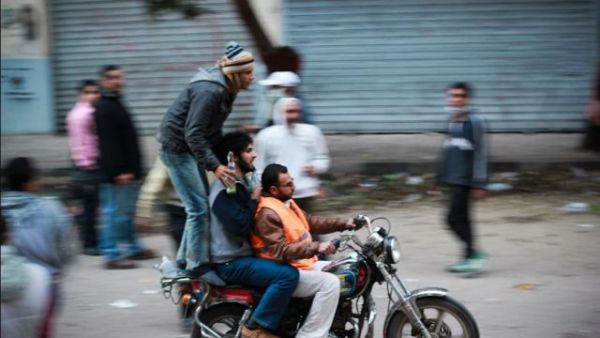It was just one month after spending his life savings on a motorbike that Mahmoud Al-Wishah collided with a car, permanently damaging his leg and hand and sustaining injuries rendering him unable to work.
Al-Wishah, a university student in his 20s, had purchased the bike to join the men who make their living by navigating the streets of Sana'a by transporting passengers on their vehicles. Motorcycles are popular in Sana'a where streets clogged with cars and minibuses make the compact bikes' ability to dodge traffic attractive. They also offer an affordable alternative to highly-priced and gas guzzling cars.
However, their widespread popularity has not come without a cost. Al-Wishah is one example of 665 people who were seriously injured in 2012 in motorbike accidents, according to the [Yemeni] Traffic General Department (TGD). The same source said 29 people died in accidents.
"Some of the victims now have permanent deformities, affecting them for the rest of their lives,” said Colonel Abdulkareem Al-Jaefi, the general manager of the traffic department in the capital city.
Such numbers are leading people to not only blame the motorcyclists' lack of self-imposed safety precautions, but also a lack of regulations from the state.
The TGD holds motorcyclists accountable for the increase of such accidents, saying the main reasons behind these accidents are neglectful practices on the part of motorcyclists, the lack of maintenance of motorbikes and a disregard of traffic regulations.
“High speed, steep roads, illegal reversing on roads and a lack of commitment to traffic signs are [to blame for] these tragic traffic accidents,” said Al-Jaefi.
However, motorbike vendors and mechanics say there is a much larger problem, and that has to do with the illegal smuggling of bike parts into the country that are not regulated.
“There are no certified motorbikes purchasing agencies in Yemen," said Mohammed Al-Ghawli, a local bike trader. "The motorbikes are made in China, and enter Yemen through sea smuggling."
Because they enter the country illegally, the bikes do not go through customs authorities.
The state has been working to try and regulate the use of motorcycles. In December 2012, the Cabinet issued a decree that required all bikers to register their motors.
This decision came after 40 military personnel were assassinated in 2012 by assailants using motorcycles, according to a report released by the Interior Ministry.
Although officials are unclear on how successful the program has been, they say it has generated revenue for the state.
“The registration revenue earned was YR140 million ($651,000). The registration cost ranges from YR9,300 ($43) to YR13,700 ($64), according to the type of the motorbike,” said Mohammed Al-Mahfadi, the general manager of revenue at the Customs Authority.
“The registration was designed on the basis of international technical standards in order to facilitate the identification of their owners. The motorbikes now have two registration plates and the numbers in the plates are clear and can be noticed from far,” said Al-Jaefi.
Although the decree to register motorbikes has been praised by many, some say it hasn't gone far enough. One issue taken with it is that it doesn't have technical requirements for the bikes.
Because maintaining a bike is expensive, bikes are often left unchecked, resulting in faulty equipment that can lead to accidents.
“The major defects the motorbikes have are related to the brakes, gears and clutches," said engineer Nasser Al-Jabli, a specialist in maintaining the motorbikes. "It is difficult to control the motorbikes while they have defects in these parts.”
In January of 2013, the state-run Al-Jamhouri hospital in Sana’a received 30 motorbike -related injuries, including those of pedestrians and passengers.
Mutae Al-Wesabi, a traffic regulator at Al-Jamhouri hospital echoed what others have said, that accidents are often the result of careless motorists.
“High speed is the main reason for the increase of accidents."
Although the state says it is working towards increasing safety standards, the debate over individual responsibility and support from authorities continues.
Al-Wishah's accident occurred two months before the state issued its decree, but he and others are unconvinced even if had been in place, the accident would have been prevented, further fueling the debate.
Tell us what you think! Do you ride a motorbike? Would you ride one in Yemen? Do let us know!









